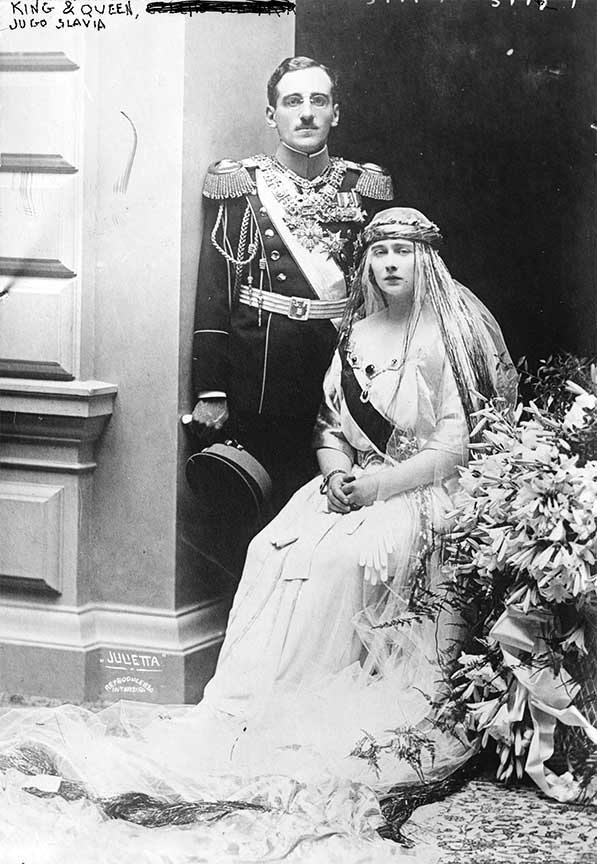King of Yugoslavia Killed

King Alexander and Queen Maria
King Alexander of Yugoslovia arrived in Marseilles on October 9th 1934 to start a state visit to strengthen relations between Yugoslovia and France. After arriving he drove through the streets of the city with French Foreign Minister Loius Barthou. A Bulgarian gunman Vlado Chernozemski stepped into the street and shot the King and wounded the foreign minister. The King died on the spot and the foreign minister died later due to the poor medical treatment he received. The whole attack was caugtht on camera and shown in movie theaters around the world.
On October 9th, 1934, the King of Yugoslavia was killed in Marseilles, France, along with the French Foreign Minister at the beginning of a state visit. The assassin a Bulgarian National, was dead on the spot. The event was captured on film and shown in theaters throughout the world.
King AlexanderI had total effective power in Yugoslavia since a coup that took place in 1929. He was an authoritarian leader who kept the trappings of democracy. He had promised to move to a full democracy but had not kept that promise. Yugoslavia international position was stable. While a dispute existed with Mussolini's Italy, the country had strong relations with Czechoslovakia, Romania, Greece, and Turkey (as part of the so-called Little Entente and Balkan Entente). Alexander's one concern was a Croatian separatist movement that had resorted to terrorist attacks. Alexander had hoped to reach a compromise to end the separatist movement, and his best hope to do that was with Ladko Maček, the leader of the Croatian Peasant Party, who had been jailed in April 1933 on charges of anti-state activities.
Alexander planned a state visit to France primarily to cement the relations between Yugoslavia and France, but also to try to use the visit as a means to help the mediation efforts that were taking place between Yugoslavia and Italy at the time. The French considered the visit important, French Senator Henry Bea "Time has come to seize the opportunity to reach an agreement between Italy, Yugoslavia and France, thus giving a common ground to protect peace. The restoration of this agreement must be based on a shared and mutual respect of the honor and rights of each party. Serbia and Italy have fought alongside on French soil, and France has struggled as well for the freedom of these nations. The outcome is far too valuable for us to allow it to become obscured and sterilized by some rivalry of prestige and influence."
The French Foreign Minister Louis Barthou was to greet the King in Marseille while the French President and the entire cabinet would be waiting for the King's train to arrive in Paris.
At 4 PM, the King arrived in Marseille Port aboard the Yugoslav destroyer Dubrovnik. He and his entourage came ashore in motorboats. At the dock to great them was Barthou. The entourage then entered a ceremonial Delage car. The car drove slowly through Marseille's streets, heading to a monument on Boulevard de la Corniche erected to commemorate those killed fighting on the Eastern Front in World War I. There Alexander planned to lay a reef. The route which was filled with thousands of supporters was heavily guarded with 1,500 police and military personal. Then the unthinkable happened, and the assassin approached the car and shot the King and others in the vehicle. Polish consular officer Jan Meysztowicz described the events as he saw them:
A few dozen meters from the Old Port, right by the stock exchange building, a man-made
his way through the front rows of the crowd gathered on the sidewalk, leapt onto the foot-
step of the vehicle and, almost touching his victims with the barrel, he emptied a whole
magazine of his heavy 10-shot Mauser. [...] The whole scene lasted a couple of seconds.
The killer's proficiency in handling an automatic pistol was proof of some intense
training in this matter. The fatally wounded monarch collapsed on the car seat while
General Georges, hit by three bullets, one of which was lodged in his chest, lost consciousness. Minister Barthou, only slightly wounded in the wrist, managed to leave the car on his
own. The police and Gardes Mobiles started shooting rather indiscriminately, killing one.
The killer had been carrying a bouquet disguising his semi-automatic Mauser C-96 pistol. He fired as many as 30 shots before being killed himself. The King died in the car, as did the chauffeur who was driving the car. The French Foreign Minister who had been wounded initially was not thought to be in any mortal danger, but the failure to give him immediate care resulted in his death as well.
The killer was identified as Vlado Chernozemski, a Bulgarian contract killer. He had worked with the Croatian separatist movement. The attack's immediate organizers were confirmed to be Ustaše Ante Pavelić and Eugen Dido Kvaternik, and they were eventually tried and sentenced to life imprisonment. Who was ultimately behind the assassination has never been definitely determined, with much of the speculation centered around Italian dictator Mussolini. Alexander was succeeded by his 11-year-old son Peter. The assassination weakened Yugoslavia.
The assassination was also the first event of its kind caught on film. As a result, millions of people worldwide watched the assassination on newsreels shown throughout the world.
 >
>